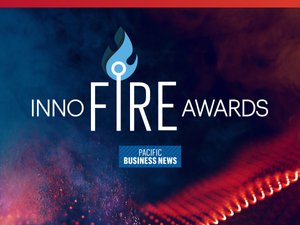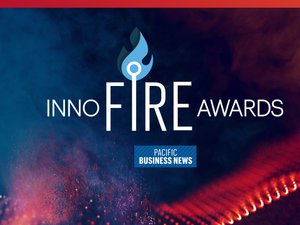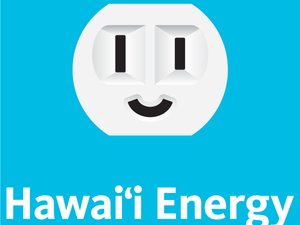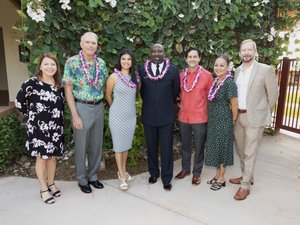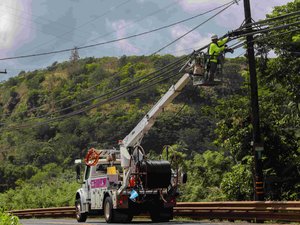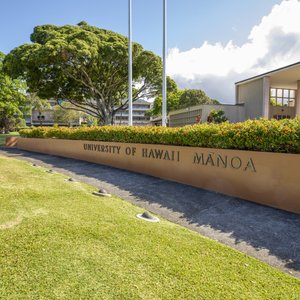Now in its second year, Pacific Inno’s Fire Awards recognize excellence in tech and innovation — including areas like food and energy independence. This includes both startups and longstanding businesses that are innovating in new ways.
The winners were chosen from a mix of nominations from the community and the PBN editorial team. This year, the awards recognize 16 businesses across four categories: energy; food and agriculture; technology, science and data; and workplace. Each category also includes one company that’s designated as the “Blazer” — the top honoree as determined by the PBN editorial team based on information provided in the nomination, growth potential and recent accomplishments.
PBN asked each of the honorees about recent funding success, as well as what they are the most excited about in their business right now. Plus, honorees also share their insights on how Hawaii can create a more robust tech sector.
Below are the honorees in the energy category. Click here for food and agriculture, and here for technology, science and data, and here for workplace.
"BLAZER"
Sunspear Energy
Jeff Kaemmerlen, CEO
Kaemmerlen co-founded Sunspear Energy in 2017, which has since completed solar installations at Daniel K. Inouye International Airport, Wet‘n’Wild Hawaii, Capitol Place, MINI of Kapolei, and more. The company specializes in innovative solar carports, electric vehicle charging stations, battery energy storage solutions, solar panel cleaning, service and maintenance.
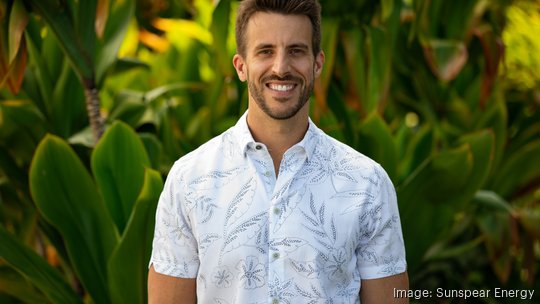
Tell us about your most recent funding success. This year we started an affiliate company to Sunspear Energy, Sunspear Hawaii Fund 1, which will be providing financing for five commercial solar projects being built by Sunspear Energy. The fund is using a combination of private equity and debt from the Hawaii Green Infrastructure Authority and commercial banks such as American Savings Bank. The five projects in this first fund’s portfolio are being allocated to several nonprofit entities that don’t have the legal structure to monetize the tax credits available for solar directly. This financing structure allows our customers to avoid incurring any upfront capital expenditure to build the system and start saving on their energy costs as soon as their system is energized by purchasing the electricity produced on the roof at a deep discount compared to purchasing it from the utility. The fund is the owner of the system and provides ongoing maintenance to ensure the systems are maximizing their energy production potential.
What about your business excites you the most right now? We are moving to a new, bigger and better location. ... The new space is much larger than our current spot and will allow the entire team to be consistently working together under one roof. We plan to set up a learning center at the new location so that we can hold training and educational seminars for our internal team as well as other industry stakeholders. We will be setting up a training area in the warehouse for practicing rooftop installation of solar equipment on a demo roof as well as a wall space for installation training of electrical equipment. Inside the office, we will be dedicating a large area as the learning room so that we can host product and technical trainings and other types of education-focused events.
What is one thing you think we need as a state to cultivate a robust tech and innovation sector? I think we should be leveraging our state's unique characteristics to ensure innovation is being allocated to areas that will help solve problems most important to Hawaii. Given the remote island geography of our state, energy and agriculture are two areas that innovation can center around because we are so reliant on systems outside of our state’s borders, which poses a large risk. Hawaii is an ideal testing ground for building de-centralized systems that bring end users closer to the resources they are consuming. Our industry, energy, is going through that right now as we see the roll-out of some of these grid services programs where private rooftops are being used to not only generate electricity, but also provide services to help stabilize the power grid. Hopefully, this can be one of many examples of innovation undertaken in Hawaii that will serve as a model for other places.
Hoahu Energy Cooperative Molokai
Todd Yamashita, president
The locally-led cooperative was formed by Molokai residents to support community-owned energy projects. Yamashita is a fourth-generation Molokai resident, and serves as Molokai director of operations for Hawaii Marine Animal Response.
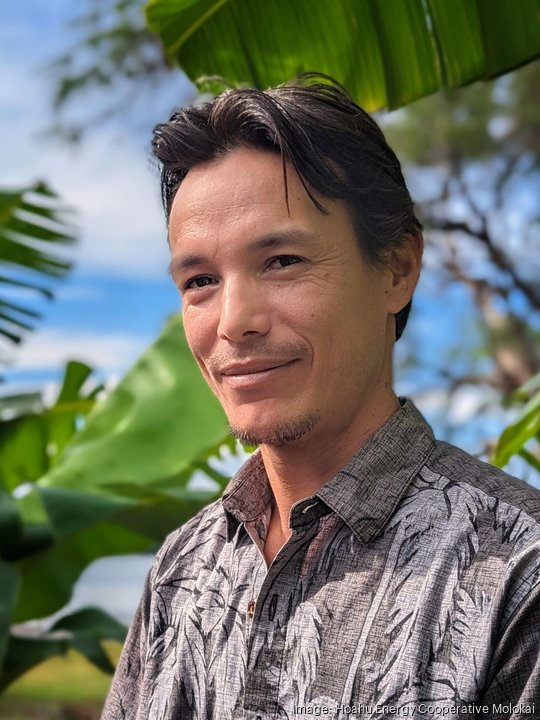
Tell us about your most recent funding success. In terms of renewable energy, Molokai is blasting out of the gate with more than $10 million for community solar in grants, appropriations and private investments during my leadership tenure with Hoahu Energy Cooperative Molokai. Success like this within two short years is owed to grassroots efforts and the sacrifice of our Molokai people, as well as a family of partners from Maui County right up to the U.S. Department of Energy, who share a common vision of resilience and sustainability for our community. Looking ahead, I’m excited to announce new partnerships with the Institute of Electrical and Electronics Engineers and solar installation companies from Maui and Oahu. Including ongoing efforts by Hoahu, the combined projects will bring solar to as many as 30 families in the coming year.
What about your business excites you the most right now? I wake up every day excited about solar. This year, I'm partnering with a mentor and local investors to provide solar plus storage for five grid-connected families on Molokai. It's a unique pilot project where my company will finance, build, own and maintain the system for the customer. Under a 15-year contract, the customer pays for only the electricity they use at a set rate. And that rate is roughly half of what Maui Electric currency charges Molokai customers. So with no money down, our customers can get hassle-free resilient renewables. With a combination of modernized gateways and smart meters, we'll have the option of aggregating the power of individual homes. This means that after we bring a few dozen homes online, we can start to aggregate the excess energy, which can be used by the utility as grid-services. It's like sharing the resilience of these projects with the rest of the island. In terms of economics, think about the outflow of cash every family pays for their utility bill every month. Instead of all of that leaving the island, these electrified homes will be recirculating that money here instead. With 85% of homes still needing solar on Molokai, this approach is smart and important.
What is one thing you think we need as a state to cultivate a robust tech and innovation sector? In order for Hawaii to meet its renewable [energy] goals, we must rely on ourselves and our partners to build from within. I was raised with a good dose of activism, which has kept our island true to its nature. When it comes to development here, we always ask: Who is planning, financing, building, owning and profiting? What is the impact? On Molokai, renewables must benefit those who need it most. By the end of the summer, Hoahu Energy will have trained and certified nearly 30 Hawaiian and local people as solar installers. Renewables are within reach, not just in our community, but probably in yours, too!
Wet 'n' Wild
Scott Loos, general manager
Loos was appointed as general manager of Wet ’n’ Wild in January 2021, and is responsible for strategic planning, development and implementation, sales, marketing and promotions. The water park’s newest attraction, Lil Kahuna Beach, is Hawaii’s first fully solar-powered attraction. Within the last year of operation, the park’s 1.3 megawatt solar carport system has produced more than 2.15 million kilowatt-hours — equivalent to powering over 200 homes, eliminating the equivalent CO2 emissions of 1,612,492 pounds of coal burned, or 3,621,608 car miles.
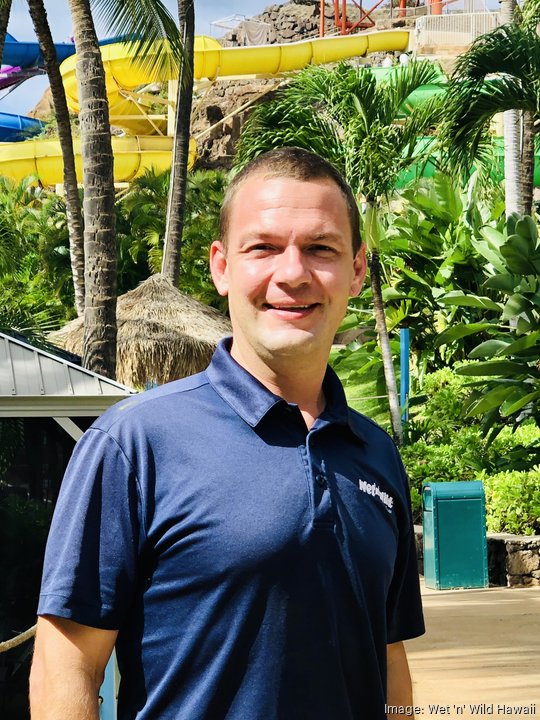
Tell us about your most recent funding success. We did a lot of strategizing and partnering to create our 1.3 MW solar system. The cost was not in our annual budget, but that didn’t mean it wasn’t possible to achieve with some strong partnerships. We got creative with funding and were able to not only build the system, but are currently about to add more solar panels and an energy storage system, which will store excess daytime solar power in the battery to power our pumps and other energy needs at night time as well as participating in a Grid Services Program that [provides support] and resiliency services to the HECO grid. In addition to the launch of the new attraction, Lil Kahuna Beach, last year, the park recently spent $500,000-plus in paint and refurbishing of rides and amenities; and invested $500,000-plus in state-of-the-art water filters and energy efficiency upgrades to machinery. This funding was possible from our corporate ownership, Premier Parks, LLC, which operates and manages themes parks, water parks, accommodations and multi-use venues throughout the U.S. and Canada.
What about your business excites you the most right now? Growth. I'm most excited about the growth in my business right now. We recently celebrated 24 years in business, and are still growing and creating more jobs than ever. In the last 12 months, our staff has grown to 200-plus [workers]. Many of these positions are [for] first-time, 16- to 20-year-old workers, which means upward mobility and a career path for local youth, as well as contributing to [a] sustainable, local economy.
What is one thing you think we need as a state to cultivate a robust tech and innovation sector? We hope to set the precedent for entertainment venues to use renewable energy to create more sustainable business models. There are infinite ways we can decarbonize and modify our business practices to use tech for more efficiency. The more we lean into renewable energy as leaders, the more robust tech and innovation can be in this state. More regenerative business strategies means keeping that innovative tech talent in-state!
Moss
Doug Rogers, senior vice president
Rogers oversees Moss’ Hawaii office, which is part of national construction company Moss, headquartered in Fort Lauderdale, Florida. Rogers has more than 40 years of construction industry experience, and his work includes overseeing multi-family residential, commercial and energy-related operations and the development of new projects in the Islands.

What about your business excites you the most right now? Our solar projects and battery storage experience in Hawaii is unparalleled, with more than 200 MW-DC and 300 MWh of battery energy storage systems built and growing. Notable projects have included the state’s largest block of solar projects in Kawailoa, Waipio, and Mililani —110 MW— as well as Hawaii’s first solar / battery energy storage systems, Mililani I Solar which was completed months ahead of schedule. As the first of its kind, Moss is in the final stages to complete the Kapolei Energy Storage, a stand-alone battery storage system, able to store 565 MWh of power to help replace the now-closed AES coal-fired co-generation facility. ... Additionally, in the last few years, Moss has completed several large multi-family residential affordable housing developments including Kaiwahine Village on Maui, and Kapolei Lofts and The Element at Hoopili on Oahu. We’re also working with the University of Hawaii, UH Foundation, and Hunt Development on a $70 million live-learn-work facility designed to increase student housing with on-site opportunities for innovation and entrepreneurship.
What is one thing you think we need as a state to cultivate a robust tech and innovation sector? Solar power and battery storage play a crucial role in creating a robust technology and innovation sector in Hawaii. The intermittent nature of solar energy production has historically been a challenge for utility-scale projects. However, advancements in battery storage technology have completely altered the equation and are making Hawaii’s ambitious goal of achieving 100% renewable energy by 2045 completely feasible.
Not only will residents see environmental benefits, but the economy will also benefit. By creating a more reliable and renewable power grid, Hawaii will be able to better support the advancement of its technology and innovation sector, which relies heavily on uninterrupted power for research, development, and the operation of innovative technologies. In turn, a strong technology and innovation sector supports entrepreneurship, attracts talent, and creates opportunities for collaboration, diversifying and strengthening Hawaii's economy.
Par Hawaii
Eric Wright, president
Wright was named president of Par Hawaii in January 2022. Under his leadership, the Kapolei oil refinery has recently announced plans to invest $90 million to develop Hawaii’s largest liquid renewable fuels manufacturing facility.
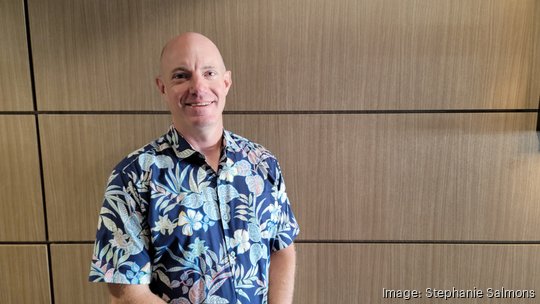
Tell us about your most recent funding success. The most recent funding success was the $90 million commitment to reconfigure one of the units at our Kapolei refinery to produce renewable fuels. Fortunately, Par Pacific, our parent company, saw the value of this project and is making this substantial investment to support our state’s renewable energy goals.
What about your business excites you the most right now? The ability to creatively reconfigure our refining assets to produce renewable diesel and sustainable aviation fuels – within two years – is exciting for all of us at Par Hawaii. We feel like we’re making history. Our team of engineers and professionals has been planning this for some time and now that it’s all coming to fruition, this has added a new dimension to our refinery. I can feel a greater sense of pride among employees knowing that Par Hawaii will be playing an important role in energy security for our island home for years to come.
What is one thing you think we need as a state to cultivate a robust tech and innovation sector? Par Hawaii is adopting state-of-the-art refining technology that will make us one of the largest producers of sustainable aviation fuels in the nation. However, there is a cautionary note here. States on the West Coast are offering significant tax credits and other incentives for the production and use of renewable fuels. Fuel will flow to where it is most valuable, so it is important that Hawaii adopt similar incentives to ensure renewable fuels can be produced and used here.
